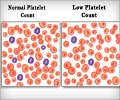An immunity protein known as interleukin 17 (IL-17), in the development of autoimmune disorders like rheumatoid arthritis and lupus.
Researchers have identified the previously unknown role of a chemical ‘messenger’ or an immunity protein known as interleukin 17 (IL-17), in the development of autoimmune disorders like rheumatoid arthritis and lupus.
Scientists at the University of Alabama at Birmingham (UAB), instigated the study by disrupting the messenger signals from the IL-17 protein to the immune system of mice, which consequently decreased the number of white blood cells, namely disease-causing B cells, in the mice’s spleen.The findings revealed that the number of B-cell clusters fell from 17 percent to 2 percent, which clearly indicated that IL-17 played an important role in shaping B cells’ ability to create more and more disease-causing antibodies.
Dr John D. Mountz, UAB professor of medicine and senior author on the study has termed the finding as an exciting discovery.
“The effect of IL-17 to slow down B cells, thereby enhancing their interaction with other immune regulatory cells a new and exciting discovery,” Nature quoted Mountz, as saying.
“This is surprising since previously IL-17 was thought to increase, but not decrease, cell motion. Now the effects of IL-17 on B cells can be explored more fully,” he added.
Hui-Chen Hsu, Ph.D. an assistant professor in the UAB Division of Clinical Immunology and Rheumatology, and also the lead author on the study, said that further research would generate new ideas for better drug treatments.
Advertisement
B cells make up the human immune system that senses the infection and retaliate without attacking normal and healthy tissue.
The findings are published in the journal Nature Immunology.
Source-ANI
LIN/M











